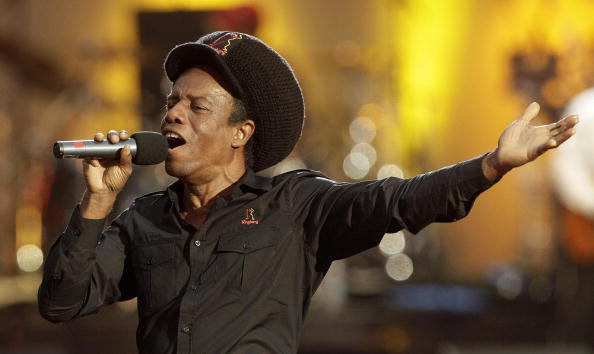What is Eddy Grant's Net Worth?
Eddy Grant is a Guyanese-British singer-songwriter and musician who has a net worth of $4 million. Eddy Grant is known for his eclectic blending of musical genres, including pop, soul, funk, reggae, and samba. He was a founding member of the rock band the Equals, with which he wrote and recorded the UK chart-topping hit "Baby, Come Back" in the late 1960s. As a solo artist, Grant had his biggest hit with his Grammy Award-nominated 1983 single "Electric Avenue."
Early Life and Education
Eddy Grant was born on March 5, 1948 in Plaisance in what was then British Guiana, South America. His father Patrick was a trumpeter. At first, Grant's parents lived in the United Kingdom while he went to school in Guiana; he eventually joined his parents in London in 1960. He went on to attend Acland Burghley School, where he learned to read and write music. After seeing Chuck Berry perform at the Finsbury Park Astoria, Grant decided to pursue music as his career.
The Equals
In 1965, Grant formed the rock band the Equals with his school friends John Hall and Pat Lloyd, as well as brothers Derv Gordon and Lincoln Gordon. Grant played lead guitar. With their unique blending of musical genres, including pop, blues, and ska, the Equals soon gained a following in London. They were noted as being one of the first racially mixed popular bands in the United Kingdom. In 1966, the Equals released their debut single, "I Won't Be There." That was followed by "Hold Me Closer," with the B-side being "Baby, Come Back." Although these singles failed to gain traction in the UK at first, "Baby, Come Back" became a number-one hit in Germany and the Netherlands. After having a top-50 hit in the UK with "I Get So Excited," the Equals saw "Baby, Come Back" reach number one in the UK when it was reissued in 1968.
Although the Equals never had another single as commercially successful as "Baby, Come Back," they did have subsequent minor hits in the UK in the late 1960s with "Laurel and Hardy," "Softly Softly," "Michael and the Slipper Tree," "Viva Bobby Joe," and "Rub a Dub Dub." The band's final charting single was "Black Skin Blue Eyed Boys," which reached number nine in the UK in 1971. That year, Grant left the group after suffering a heart attack and a collapsed lung; following some other departures, the Equals disbanded in 1979. The group got back together in 1982, and various lineup changes occurred over the ensuing decades. In 2022, the Equals released their first single in over 30 years: "Nobody's Got Time," which was written by Grant. The band went on to continue recording and touring.

SHAUN CURRY/AFP/Getty Images
Solo Career
After leaving the Equals, Grant pursued a solo career. In 1972, he launched Coach House Studios on the grounds of his home in London, and in 1974 he founded the label Ice Records in Barbados. Grant released his self-titled debut solo album in 1975, and his second album, "Message Man," in 1977. On the latter, he played nearly every instrument. In 1979, Grant released his third solo album, "Walking on Sunshine," which launched the UK top-20 hit "Living on the Frontline." After releasing "Love in Exile" in 1980, Grant had his commercial breakthrough as a solo artist with his 1981 album "Can't Get Enough," which included his top-10 UK single "Do You Feel My Love." He subsequently moved to Barbados, where he opened Blue Wave Studios and released his biggest hit album, "Killer on the Rampage," in 1982. Peaking at number seven in the UK and number ten in the US, the album spawned the smash singles "Electric Avenue" and "I Don't Wanna Dance." The former went on to receive a Grammy Award nomination for Best R&B Song.
Grant struggled to find commercial success again after "Killer on the Rampage" and its two hit singles. He released a string of albums that failed to chart, including "Going for Broke" (1984), "Born Tuff" (1986), and "File Under Rock" (1988). However, Grant did have a substantial hit with his single "Gimme Hope Jo'anna," an anti-apartheid song that reached number seven in the UK in 1988. In the 1990s, he released the albums "Barefoot Soldier," "Paintings of the Soul," "Soca Baptism," and "Hearts and Diamonds," but none charted. Grant was most notable during the decade for introducing a new musical genre known as ringbang, which combines various African rhythms. Grant released only one studio album in the '00s, "Reparation," which came out in 2006. He didn't release another studio album until "Plaisance," which came out 11 years later. Its title refers to Grant's hometown in Guyana.
Work for Other Artists
Beyond his own music, Grant has written songs and produced for several other artists, including the Pyramids, Prince Buster, the Pioneers, and David Rudder. Additionally, through his Ice Records label in Barbados, he has produced for such local calypso artists as Grynner, Mighty Gabby, and Mighty Sparrow.
Personal Life
With his wife Anne, Grant has four children.
/2016/10/Eddy-Grant.jpg)
/2014/08/GettyImages-487129503.jpg)
/2014/11/GettyImages-889267454.jpg)
/2015/05/Mark-King-1.jpg)
/2019/03/Cindy-Wilson.jpg)
/2013/06/billyo.jpg)
/2019/01/James-Altucher.jpg)
/2013/12/dan.jpg)
/2011/12/John-Mara-1.jpg)
/2010/12/kate-1.jpg)
/2020/10/the-miz.png)
/2011/12/Rooney-Mara1.jpg)
/2020/08/gc-1.jpg)
/2014/04/GettyImages-886617106.jpg)
/2011/01/Aaron-Rodgers.jpg)
/2022/10/peter-krause.jpg)
/2010/03/emil.jpg)
/2016/10/Eddy-Grant.jpg)
/2013/06/billyo.jpg)
/2015/02/ih2.jpg)
/2017/08/Holly-Johnson.jpg)
/2019/03/Cindy-Wilson.jpg)
/2015/05/Mark-King-1.jpg)
/2014/10/GettyImages-72823338.jpg)
/2017/01/Dave-Hollister-e1602021105881.jpg)